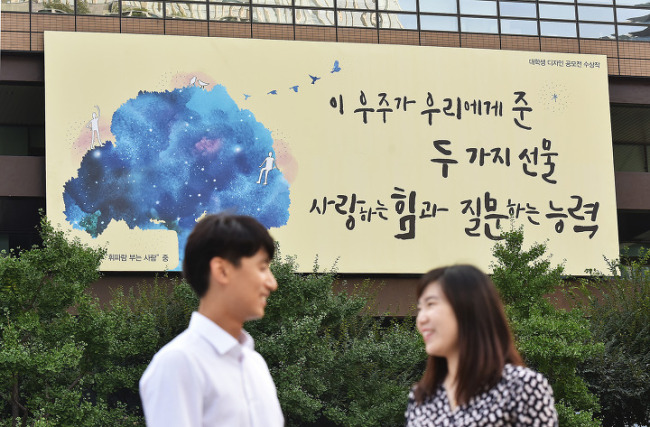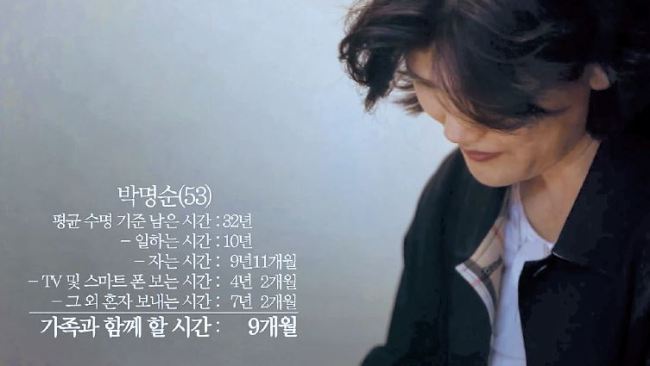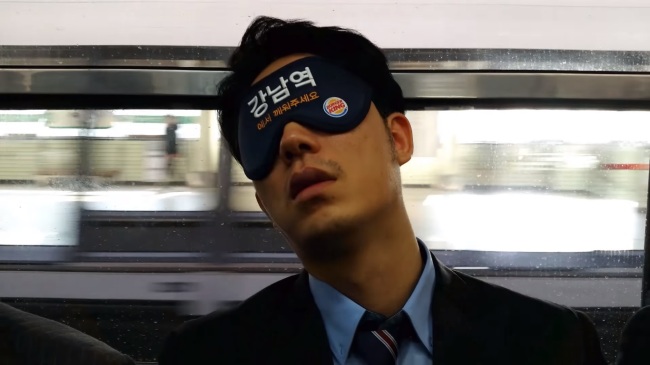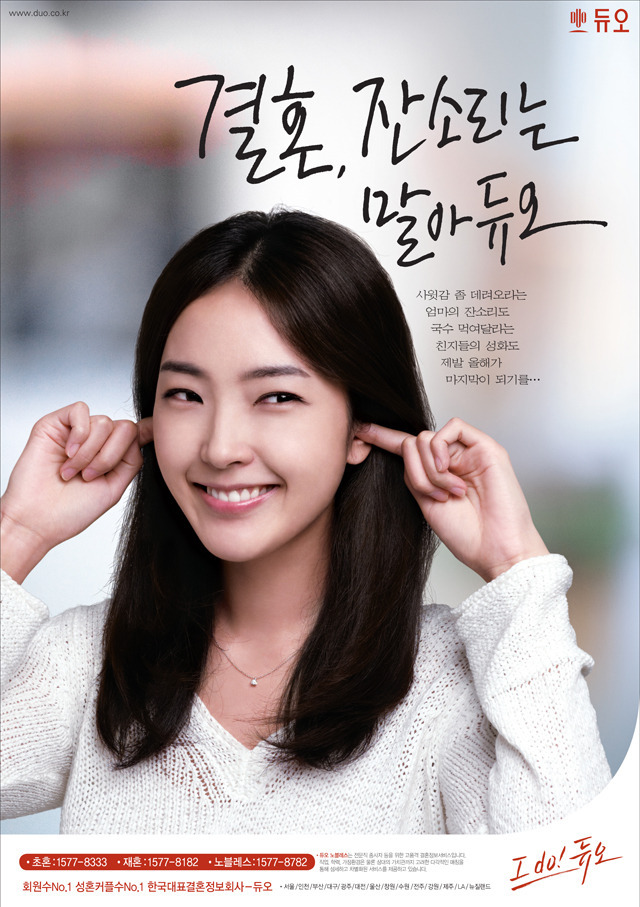[Weekender] Relatable, consoling campaigns tug at hearts of modern Koreans
By Sohn Ji-youngPublished : Nov. 27, 2015 - 19:42
For the last 25 years, a billboard inscribed with messages of hope, courage and love has been hanging on the Kyobo Life Insurance headquarters in southern Seoul.
“Though simple, the words have consoled me during times of hardships and reminded me of life’s priorities during busy periods,” said 35-year-old Kim Yong-bae, who passes by the billboard on his way to work every day.
“Though simple, the words have consoled me during times of hardships and reminded me of life’s priorities during busy periods,” said 35-year-old Kim Yong-bae, who passes by the billboard on his way to work every day.

Originally established as a part of Kyobo Life’s advertising campaign, the iconic message board, typically featuring phrases from poems, has been offering a sense of comfort and encouragement to Seoulites over the past decades.
Today, mainstream advertisements in South Korea are taking a general turn toward communicating similar heartwarming messages ― intricately crafted with the right details and content to strike the appropriate emotional and humorous notes with the public.
As Korean society faces prolonged hardships, including a continued economic downturn, high youth unemployment and one of the world’s longest average working hours, experts say modern ads focus on delivering heartwarming and relatable messages of value that go beyond simply promoting a product or company.
“Advertisements by nature represent the state of current society, including its economy and culture, following the direction of people’s changing thoughts and livelihoods,” said Lee Myoung-chun, a professor at Chung Ang University’s department of advertising and public relations.
“As the economy remains stagnant, the youth struggle to find jobs and families face more financial strain, the public is in dire need of warmth, hope and recognition of their hardships ― and such considerations are reflected in today’s advertisements,” he said.
Many of the ads recognized at the 2015 Korea Advertising Awards held earlier this month touched upon relatable subjects like the importance of family and love. At the same time, they were highly reflective of Koreans and their modern lifestyles, leaving viewers with food for thought or a small smile.

A Samsung Life Insurance video ad titled “The Time You Have Left,” which won second place, begins with a doctor telling a number of people who came to see the results of their health exam that they have just “a couple of years” left, perhaps a good nine months.
Viewers soon discover that the number represents the time that people actually have left to spend time with their family, after subtracting all the hours spent working, sleeping, watching TV, meeting friends, and so on. As the participants share their touching reflections, Samsung accentuates the irreplaceable value of family.
Another award-winning video, by Burger King,is titled “Start Your Morning Like a King.” Mindful of many sleep-deprived Koreans who travel long ways on the subway get to work, the firm hands out sleep masks marked with the final station they need to get off, asking them to “sleep tight without worrying.”

As the subway train approaches the appropriate stop, many strangers scramble to wake up the user, informing the person to get off, as the fast food chain promises to help customers enjoy their “morning like a king.”
In addition to the mind-capturing content, the two ads ― around 3 to 5 minutes long ― represent a new generation of longer, online-tailored ads anchored in humanistic storytelling, according to professor Kim Hee-jin from Yonsei University’s department of mass communications.
“Video ads ― long considered the most effective form of advertising and presented on television ― are adapting to the digital age. Today’s advertisers understand that well-crafted ads which can strike the right chord with the public go viral on social media, as people no longer passively consume ads but become agents of dispersion,” said the Yonsei professor.
And that right chord in today’s context typically involves values like family, love and friendship ― concepts often lost or overlooked by today’s fast-moving Korean society ― plagued by a prolonged economic slump and low public morale, according to Kim Sang-hoon, a communications professor at Inha University.
This does not necessarily mean that all modern ads are tearjerkers or emotional. Creative and clever ads will always garner much public attention and interest, regardless of format or content, he said.

Winning praise from the nation’s 20- and 30-somethings, Duo, Korea’s largest marriage agency, published a special print ad during the Chuseok holidays, when young people face heightened pressure to get married during large family gatherings.
The ad, placed inside subway stations and public spaces, shows a smiling woman covering her ears alongside text that reads “may this year be the last of mom’s nagging about finding a husband and irritating relatives.”
The grand winner of this year’s Korea Advertising Awards was a pro-recycling public ad produced by Innocean and the Environment Ministry titled “I Am Your Father.” A milk carton throws itself to save a roll of toilet paper from being sucked into the vacuum machine, suggesting that the milk carton “fathered” the toilet paper through recycling.
“At the end of the day, the essence of advertising remains unchanged. Ads which are adequately humorous, able to move people’s hearts in humanistic ways, or does both, will continue to be successful,” said Cho Jae-hyun, a professor of advertising at Daejin University.
By Sohn Ji-young (jys@heraldcorp.com)









![[Hello India] Hyundai Motor vows to boost 'clean mobility' in India](http://res.heraldm.com/phpwas/restmb_idxmake.php?idx=644&simg=/content/image/2024/04/25/20240425050672_0.jpg&u=)









